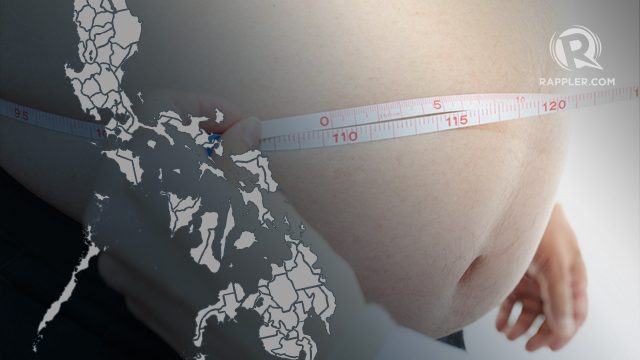SUMMARY
This is AI generated summarization, which may have errors. For context, always refer to the full article.

MANILA, Philippines – Addressing obesity is still a big challenge in the Philippines. There is no single factor that causes it, assistant secretary of Health Maria-Bernadita Flores said during the launch of the 2015 Nutrition Month on Wednesday, July 1.
According to Flores, “poor individual choices” alone do not result in overnutrition. Suffering from excess weight has become a complex interplay of several factors, including changing physical environment, socio-economic status, dietary patterns, and minimal physical activities.
To raise awareness on the possible effects of obesity on one’s health, this year’s Nutrition Month on the rising number of overnourished Filipinos with the theme: “Timbang Iwasto Sa Tamang Nutrisyon at Ehersisyo (Achieve normal weight through proper nutrition and physical activity).”
According to the latest National Nutrition Survey (NNS) by the Food and Nutrition Research Institute, one out of 3 Filipino adults aged 20 and above is either obese or overweight. (READ: What is the nutritional status of Filipinos?)
There has also been a steady increase in the prevalence of obesity and overweight in the country in the last two decades. (READ: The problem with double burden malnutrition)
Everyone’s responsibility
Overnutrition is now more of a “societal problem” than a health concern, Flores emphasized.
Addressing it needs the support of various sectors – from promoting good health habits and changing their very own ways of eating.
“Everybody has a responsibility to prevent overweight and obesity,” Flores said.
“Individuals must have the will to eat healthy and level up their physical activity,” she added.
In the household level, parents or guardians should closely monitor their children in order to prevent obesity at a young age. This can be done by urging them to eat healthy meals than fastfood.
However, the “aggressive marketing” of unhealthy products in the food industry remains a challenge.
Flores said the government should intervene to correct the current situation of the food industry’s failure in promoting good nutrition and consuming good nutrients.
“Laws must be enacted to regulate the marketing of foods and beverages to children,” she said.
“Both the national and local government must be able to scale up their respective nutrition interventions so that children grow properly and reduce their risk of obesity in later life,” Flores noted.
Make health food available
The NNC continues its calls to ensure that products with the right nutrients are accessible and affordable, giving consumers a wide array of healthy choices.
Unfortunately, the increase in food prices makes it difficult for the average Filipino to get the most nutrients with the kind of food they can afford. (READ: Is the minimum wage enough for a day’s worth of nutritious meals?)
According to NNC, families should start their own backyard gardens that can produce vegetables for their own consumption. If there are surplus, they may sell them to their own community.
If done properly, eating healthy will not only be widely colloquially known as “dieting” because a person does not need to go on a diet to be considered healthy.
Flores called on the public to do its share in preventing overweight and obesity.
“The call to action does not end with the end of the Nutrition Month but only the beginning.” – Rappler.com
Add a comment
How does this make you feel?
There are no comments yet. Add your comment to start the conversation.